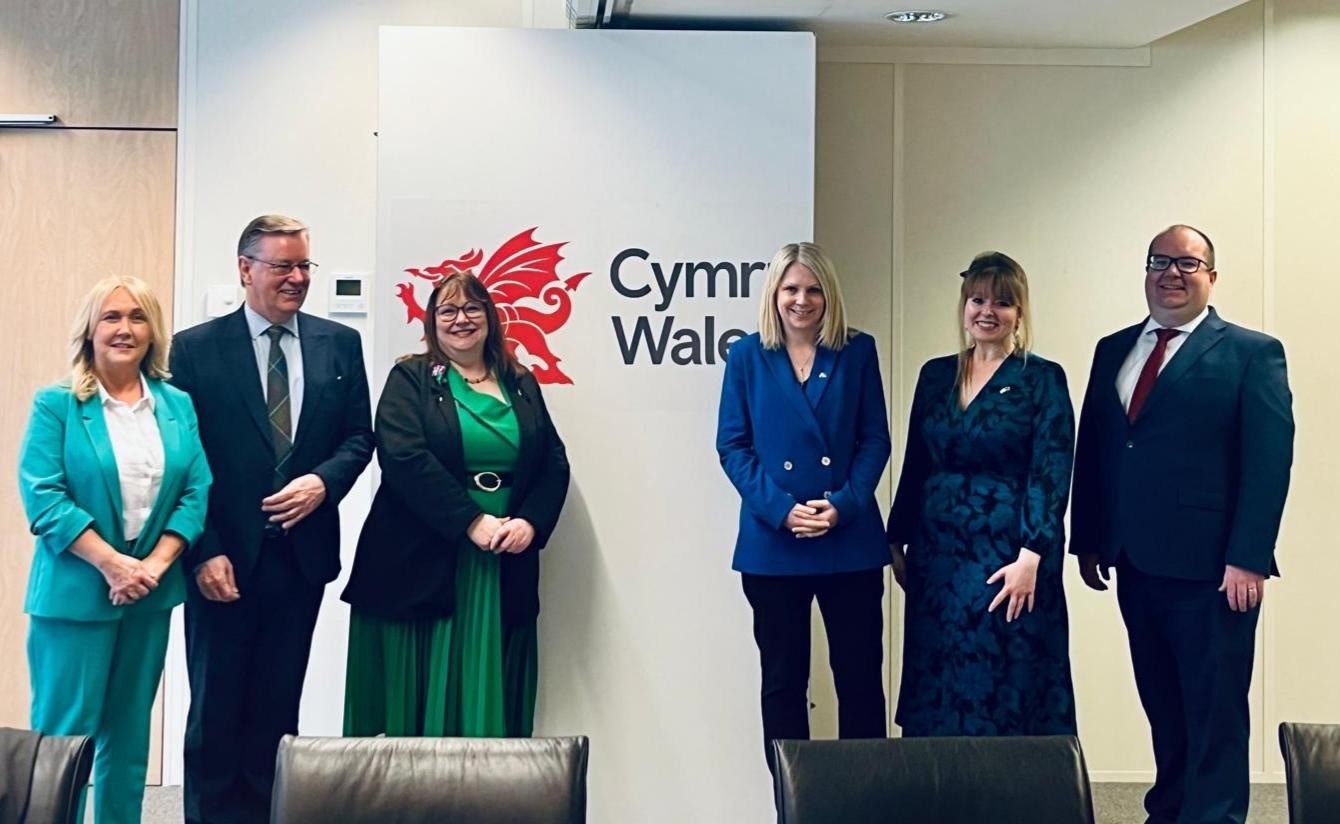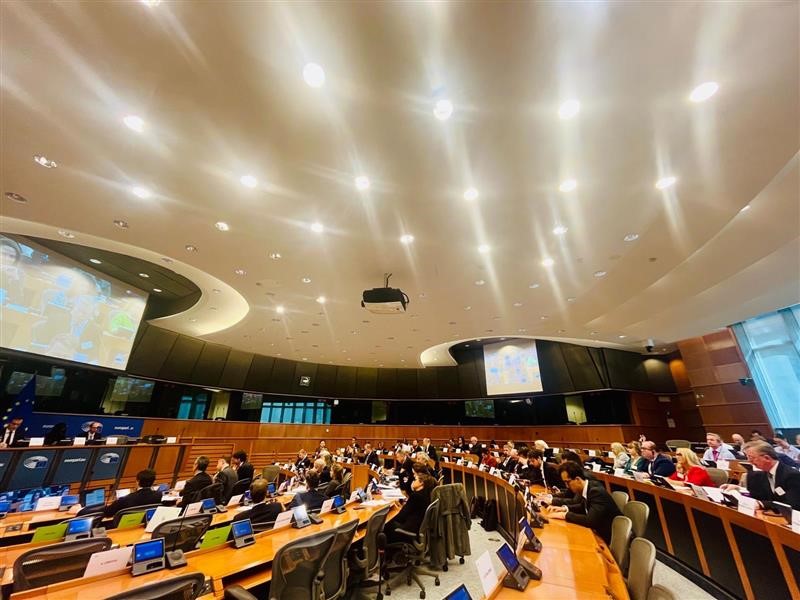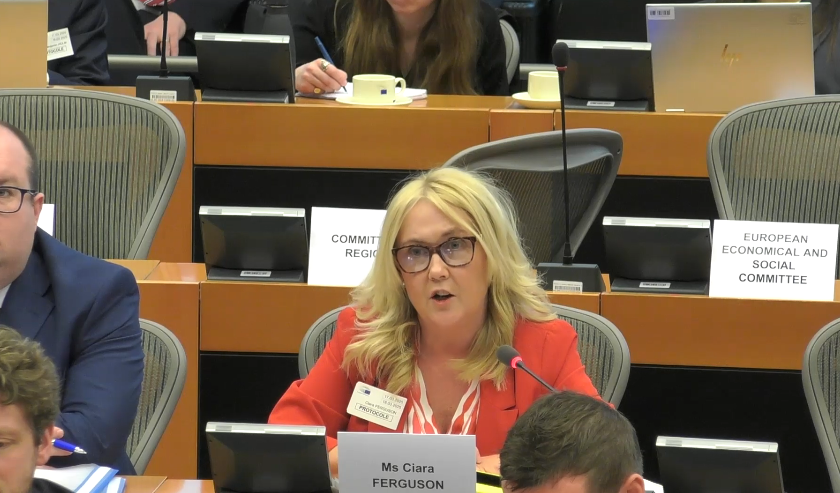Brexit & Beyond newsletter
18 March 2025
Welcome to the 18 March 2025 Brexit & Beyond newsletter
The EU-UK Parliamentary Partnership Assembly has been taking place in Brussels with Ciara Ferguson MLA and David Brooks MLA attending.
Last Wednesday, the Cabinet Office published the government's summary of the European Commission Work Programme 2025: Moving forward together: A Bolder, Simpler, Faster Union.
The Product Regulation and Metrology Bill completed its House of Lords stages on Wednesday. The Bill was presented to the House of Commons on 13 March (the first reading). It is expected to have its second reading debate on a date to be confirmed.
Last Wednesday, the House of Commons Northern Ireland Affairs Committee held the first oral evidence session of its inquiry into the operation of the Windsor Framework. The House of Lords Northern Ireland Scrutiny Committee launched its first inquiry on Strengthening Northern Ireland’s voice in the context of the Windsor Framework with the publication of a call for written evidence.
- EU-UK Parliamentary Partnership Assembly
- European Commission Work Programme 2025
- Carbon Border Taxes
- Product Regulation and Metrology Bill
- The operation of the Windsor Framework
- House of Lords Northern Ireland Scrutiny Committee
- The Global Ocean Treaty
- Council of Nations and Regions
- Other news
EU-UK Parliamentary Partnership Assembly
The EU-UK Parliamentary Partnership Assembly (PPA) was set up after the EU-UK Trade and Cooperation Agreement (TCA) came into effect in January 2021. It provides a space for the European Parliament and the UK Parliament to discuss and share views on EU-UK relations. The Assembly can also ask the Partnership Council – the key body responsible for overseeing the TCA’s implementation – for information and suggest recommendations.
The Partnership Council is co-chaired by Maroš Šefčovič, the European Commissioner, and Nick Thomas-Symonds, the UK Paymaster General and Minister for the Cabinet Office.
 Tweeting on Monday night, Minister Thomas-Symonds said “Another positive meeting with Maroš Šefčovič today. We discussed preparations ahead of the UK/EU Summit on 19 May and committed to ensuring progress continues to be made on areas that strengthen UK-EU cooperation.”
Tweeting on Monday night, Minister Thomas-Symonds said “Another positive meeting with Maroš Šefčovič today. We discussed preparations ahead of the UK/EU Summit on 19 May and committed to ensuring progress continues to be made on areas that strengthen UK-EU cooperation.”
The 5th meeting of the EU-UK PPA is taking place in Brussels on Monday and Tuesday. Ciara Ferguson MLA (Sinn Féin) and David Brooks MLA (DUP) are attending the EU-UK PPA. On Monday morning Members from the devolved legislatures met at Wales House to discuss preparations for the PPA and other issues including youth mobility.
 L-R: Ciara Ferguson MLA, Alexander Stewart MSP, Clare Adamson MSP, Hannah Blythyn MS, Delyth Jewell MS and David Brooks MLA
L-R: Ciara Ferguson MLA, Alexander Stewart MSP, Clare Adamson MSP, Hannah Blythyn MS, Delyth Jewell MS and David Brooks MLA
On Monday there was an exchange of views between Commissioner Šefčovič and the Paymaster General and Minister for the Cabinet Office, Nick Thomas-Symonds MP on the state of play within the Partnership Council.
Commissioner Šefčovič said, “The EU and the UK are like-minded partners” and noted they have been working “closely together on shared challenges”.
Referring to the Withdrawal Agreement, including the Windsor Framework, and the Trade and Cooperation Agreement, Commissioner Šefčovič said they “are the cornerstone of our bilateral relations.
The full and faithful implementation of these agreements is crucial for the development of structured strategic cooperation between the EU and the UK.
As regards the Withdrawal Agreement, citizens' rights remain a top priority for the EU.”
Commissioner Šefčovič said “looking back to where we were two years ago, we can be proud about how much progress we have made. On VAT and excise, State Aid, SPS, TRQs arrangements for steel and meats, medicines, customs, and engagement with Northern Ireland businesses and civic groups. The list is long and I am grateful for every element.
The Windsor Framework relies on a careful balance of flexibilities and safeguards. More work is needed to ensure full delivery of all the safeguards, especially in the operation of the agri-foods/SPS and customs arrangements. We should keep up our efforts to deliver the full implementation of the Windsor Framework. We want to deliver benefits for people and businesses in Northern Ireland, while protecting the integrity of the EU Single Market and avoiding a hard border on the island of Ireland.”
On the TCA, Commissioner Šefčovič commented, “It is clear that the TCA is not, and can never be, a substitute for UK membership of the EU. The TCA is a structural response to the red lines set by the UK during the negotiations. These red lines have remained in place today: no Single Market, no Customs Union, no Free Movement of Persons.
It is also true, however, that the TCA has much potential still to be exploited. We are committed to making the most of the TCA and building upon it as we advance our relations with the UK.”
 The EU-UK Parliamentary Partnership Assembly meeting on Tuesday at the European Parliament in Brussels
The EU-UK Parliamentary Partnership Assembly meeting on Tuesday at the European Parliament in Brussels
Minister Thomas-Symonds said “The UK and EU’s future will be defined by how we both tackle our shared challenges together.”
He told the Assembly,
“The UK government was elected on a mandate to increase our security, keep our citizens safe and to encourage growth.
Europe is a crucial partner in these priorities…
…and, indeed, Europe shares those concerns.
That is why we are living up to the obligations we have in existing Agreements and Frameworks…
…that is how trust is earned.”
Turning to the Windsor Framework, Minister Thomas-Symonds said, “As ‘Businesseurope’ set out in a report this Autumn, and I quote: “There remain many unnecessary barriers to trade and investment. Following the elections of new governments in the EU and UK, there is a clear opportunity to upgrade the relationship to deliver for businesses and citizens.”
And that is why we want to build on the structures we have - the TCA and the Windsor Framework…
…to tear down trade barriers and make Brexit work better for the British and European people.
We have already said that we will seek to negotiate a sanitary and phytosanitary agreement…
…to help boost trade…
and deliver benefits to businesses and consumers in both the UK and the EU.”
Monday’s break out groups on: AI and data protection; climate and energy cooperation; and, regulatory cooperation in financial services reported back to the Assembly on Tuesday morning. Later the Assembly exchanged views on trade, customs and sanitary and phytosanitary (SPS) measures and Youth opportunities.
Ciara Ferguson MLA addressed the Assembly and noted the loss of opportunities previously available under the ERASMUS +, suggesting that the British and Irish governments find a solution to make these opportunities available for young people in Northern Ireland.
 Ciara Ferguson MLA speaks at the EU-UK PPA on youth mobility
Ciara Ferguson MLA speaks at the EU-UK PPA on youth mobility
European Commission Work Programme 2025
On 12 February 2025, the European Commission published its work programme (CWP) for 2025 entitled ‘Moving forward together: A Bolder, Simpler, Faster Union ' which outlines the key legislative and policy actions it plans to take in the upcoming year. Last Wednesday, the Cabinet Office published the government's summary of the work programme.
It states that the CWP contains:
- 51 new policy initiatives; an increase from 18 in 2024.
- 11 of 18 legislative initiatives have a simplification objective or dimension.
- 37 evaluations and fitness checks to identify where legislation may be simplified, to reduce costs and consolidate rules.
- The proposed withdrawal of 37 existing proposals; the repeal of 4 legislative acts; and 123 pending legislative proposals linked to the key strands of the CWP
The government suggests that “some initiatives brought forward under the CWP may engage the scrutiny arrangements for the Northern Ireland Assembly provided for in Schedule 6B of the Northern Ireland Act 1998 (i.e. the Windsor Framework Democratic Scrutiny Committee). This may include those initiatives concerning clean industry, the circular economy and decarbonisation, and initiatives on the operation of the EU’s Single Market. The Government will continue to uphold its scrutiny commitments on EU legislation to Parliament and the Northern Ireland Assembly through the depositing of Explanatory Memoranda.”
On Thursday Assembly Research Officers briefed the Windsor Framework Democratic Scrutiny Committee on the European Commission’s 2025 Work Programme. They identified those initiatives or proposals in the CWP 2025 which are potentially either ‘replacement acts’ or ‘new acts’ under the Windsor Framework.
Carbon Border Taxes
Lord Livermore, the Financial Secretary to the Treasury told the House of Lords on Wednesday that to “ensure that the costs of complying with the UK carbon border adjustment mechanism are proportionate, it will apply only to those firms importing CBAM goods valued at £50,000 or more over a rolling 12-month period. The Government estimate that this will exclude 80% of CBAM-eligible firms while retaining more than 99% of imported emissions within the scope of the tax.”
He continued to say that “alignment is helpful to UK competitiveness. We recognise that alignment with existing regimes can reduce administration burdens, so we will align where appropriate and we will follow developments on the EU CBAM very closely. We also continue to explore all options to improve trade and investment with the EU, which includes the UK and EU giving serious consideration to linking our emissions trading schemes.
Fertiliser production in the UK is subject to carbon pricing under the UK Emissions Trading Scheme. A UK CBAM will ensure that fertiliser produced overseas faces a comparable carbon price to equivalent goods produced in the UK. Most UK agricultural prices are a function of a range of international factors and the Government do not expect a CBAM on fertiliser to put UK farmers at a competitive disadvantage.”
Last Wednesday, Lord Carlile, Chair of the House of Lords Northern Ireland Scrutiny committee wrote to the Secretary of State for Northern Ireland. In his letter, Lord Carlile said the Committee “note that the Commission decided to introduce its CBAM incrementally in order to allow “for a careful, predictable and proportionate transition for EU and non-EU businesses”. In light of the Commission’s stated desires, we are deeply concerned by the current uncertainty regarding CBAM’s potential application to and impact on Northern Ireland.”
He invited the Secretary of State to respond to the following two questions:
- whether or not the Regulation introducing the CBAM would, as the Commission wished, be added to the list of EU law that applies to Northern Ireland by virtue of the Protocol/Windsor Framework; and,
- if so, what the implications of such a development would be for Northern Ireland.
Lord Carlile also said the Committee would “welcome an explanation of the consequences for Northern Ireland of the Government’s recently stated “ambition” to link the UK’s and EU’s “respective [carbon pricing] systems” and asked what discussions have taken place to that end?
Product Regulation and Metrology Bill
As previously reported, the Product Regulation and Metrology Bill will give the Government the power to set product regulations. The Bill’s Explanatory Notes state this is to ensure “that the law can be updated to allow a means of recognising new or updated EU product requirements, with the intention of preventing additional costs for businesses and provide regulatory stability.” It completed its House of Lords stages on Wednesday.
Lord Leong, the Lord in Waiting/Government Whip told the House of Lords that the UK Government has “been engaging constructively with the devolved Governments throughout its passage. Although their consent has not yet been provided, we are hopeful of securing legislative consent from Scotland, Wales and Northern Ireland.”
The Bill was presented to the House of Commons on 13 March. This is known as the first reading and there was no debate on the Bill at this stage. It is expected to have its second reading debate on a date to be confirmed.
Last Monday the Chair of the House of Lords Northern Ireland Scrutiny committee, Lord Carlile wrote to Lord Leong. He asked a number of questions about the Bill as it relates to Northern Ireland including:
- What will be the impact of the Bill on Northern Ireland?
- How will the Bill interact with the Windsor Framework?
- What is the basis for the Government’s view [that the Bill will have a positive impact on trade between Northern Ireland and the rest of the UK]?
- What will be the impact on trade on the island of Ireland?
- Will the Government work to monitor, review and carefully assess the implications of regulatory divergence for Northern Ireland?
- In considering the use of the powers contained within this Bill, by what process does the Government propose to monitor upcoming regulatory divergence between the UK and EU across the range of affected policy areas?
- Will the Government consider a central log or similar co-ordinating mechanism between departments to ensure that instances of regulatory divergence are tracked and managed?
- What, if any, consultation has the Government carried out with the Northern Ireland Executive?
- What, if any, views were expressed by the Northern Ireland Executive on the objectives and specific provisions of the Bill?
- When was legislative consent from the Northern Ireland Assembly sought, and what was the response?
The Chair requested that Lord Leong respond by the end of March 2025.
The operation of the Windsor Framework
Last Wednesday, the House of Commons Northern Ireland Affairs Committee held the first oral evidence session of its inquiry into the operation of the Windsor Framework. The witnesses were:
• Neil Johnston, Director at Northern Ireland Retail Consortium
• Anne-Marie Murphy,Director of Strategy and Emerging Markets at NI Consumer Council
• Jennifer Pheasey, Director of Public Affairs at Horticultural Trades Association (HTA)
• Nichola Mallon, Head of Trade and Devolved Policy at Logistics UK
Nichola Mallon (Logistics UK) highlighted “a consensus within our membership that the Windsor framework was to some extent oversold. It created a misperception that all the challenges under the Northern Ireland protocol had been removed. That has created two effects: it has contributed to a lack of awareness, particularly among GB businesses, of the requirements that must be met under the Windsor framework; and, to some degree there, is a reluctance among some GB-based businesses to trade into Northern Ireland because of the administrative burden and cost of meeting all the necessary requirements.”
Jennifer Pheasey (HTA) explained, “Fundamentally, the challenge we have is that Northern Ireland is within the EU’s plant health area. The Windsor framework does not change that. Many of the challenges that we face in terms of compliance, delays, checks, inspections and so on will not be addressed until we see a change there.”
Asked about the upcoming introduction of the UK internal market scheme, Nichola Mallon (Logistics UK) said: “The challenge comes if you are moving vast quantities of different commodities that change on a very regular basis. When we speak to our members about their appetite to avail of the simplified processes from a customs perspective from 31 March, they say it is very much in the “too hard” box. There are challenges.
From the logistics industry perspective, we are very concerned in respect of the changes to parcel movements from 31 March. Currently, parcels move under the waiver—there are no new requirements—but from 31 March there are significant new processes that will be required if you are moving consumer parcels, and particularly if you are moving business-to-business parcels.”
Neil Johnston highlighted the concerns of the NI Retail Consortium: “Given the complexity of what is being moved, we have a situation where one of the supermarkets is filling in tens of thousands of customs declarations at a cost of £1.5 million. If you replicate that across the sector, it is a significant burden. Although we are assured by members that they are in a position to go, it is highly likely that we will notice problems on 31 March.”
Jennifer Pheasey (HTA) highlighted that the mail-order situation for plants, bulbs, seeds is one of the key challenges in the horticulture sector stating: “You cannot really send anything, because the requirements essentially mean that the consumer needs to be a professional operator to receive the parcel. Even sending something very small, such as a couple of packets of seeds, would require a phytosanitary certificate. It is just not commercially viable to spend that time doing that.”
She argued for an “SPS agreement that addresses GB-NI trade for plants, seeds, bulbs… to include recognition and respect for each other’s plant health regimes. That would ultimately unlock many of the challenges”.
Following the evidence session, Logistics UK published this article.
House of Lords Northern Ireland Scrutiny Committee
Last Thursday, the House of Lords Northern Ireland Scrutiny Committee launched its first inquiry on Strengthening Northern Ireland’s voice in the context of the Windsor Framework with the publication of a call for written evidence. This new inquiry will take full account of the evidence taken by the former European Affairs Sub-Committee on the Windsor Framework.
On Wednesday the Committee will hear from:
- Mr George Peretz KC BL, Barrister at Monckton Chambers
- Dr Clare Rice, Research Fellow at School of Social and Political Science, University of Edinburgh
- Roderick Crawford, Senior researcher at Policy Exchange
The Chair of the Northern Ireland Scrutiny Committee wrote to Nick Thomas-Symonds MP, Minister for the Cabinet Office and Minister for the Constitution and European Union Relations to ask further questions on matters including what adjustments are being made to ensure supply of veterinary medicines and what the government's current assessment is of products at risk of discontinuation. Lord Carlile asked that the Minister respond by 3 April.
The Global Ocean Treaty
Last Monday in the House of Lords, Baroness Hayman of Ullock, the Parliamentary Under-Secretary of State at the Department for Environment, Food and Rural Affairs, was asked about the ratification of the Global Ocean Treaty (also known as the High Seas Treaty). This treaty was agreed by UN negotiators on 6 March 2023, after nearly ten years of negotiations.
Baroness Boycott (Crossbench) raised a concern about whether there would be primary legislation to ratify the treaty before the UN conference in June. She pointed out, “If we have not ratified our treaties… we will not have a seat at the first ocean COP.”
In response, Baroness Hayman explained that the UK government is “committed to partnering with others, particularly the global South and the Commonwealth Secretariat, to ratify and implement the agreement… The first meeting will take place at the UN in New York this April.”
Baroness Sheehan (Liberal Democrat) then pressed on the timeline, asking if ratification needed to happen before June 2025 for the UK to have a voice at the COP process. Baroness Hayman clarified that the UN ocean conference is a separate event and emphasized that it is not a deadline for ratification of the treaty.
Council of Nations and Regions
Baroness Smith of Cluny, the Advocate-General for Scotland, outlined the intended functions and constitutional role of the Council of Nations and Regions in the House of Lords on Tuesday. She said: “the council is designed to facilitate genuine partnership working between the UK Government, the devolved Governments, the Mayor of London and the mayors of combined authorities and combined county authorities. It brings together Governments and authorities with devolved responsibilities to determine actions for tackling some of the biggest and most cross-cutting challenges the country faces. The functions of the council are set out in its published terms of reference.”
Baroness Smith clarified, “The Council of the Nations and Regions is a unique forum, and it is different from any others. Each forum serves a specific purpose, as does the British-Irish Council. Many of them come from historic agreements and situations. The Council of the Nations and Regions is in no way intended to replace any existing structures, but simply to supplement them.”
Other news
- Last Tuesday, the House of Lords International Agreements Committee launched a call for evidence to support its inquiry into the UK treaty scrutiny process.
- Ambassador James Kariuki, UK Deputy Permanent Representative to the UN made a statement at the UN Security Council meeting on cooperation with the EU last Tuesday. He said “The United Kingdom welcomes the EU’s ongoing commitment to championing multilateralism, tackling global challenges and assisting the Security Council’s work.”
- The House of Commons Library published the insight: US tariffs on EU goods: What could it mean for Northern Ireland?
- On Friday, the Centre for Cross Border Cooperation published a Briefing Note on the Electronic Travel Authorisation scheme and the Windsor Framework.
- Last Friday, the Minister for European Union Relations, Nick Thomas-Symonds, delivered a lecture at the Centre for European Legal Studies, University of Cambridge in which he said “a cooperative relationship with the EU is in the UK’s national interest.”
- Senedd Research has published the article To align or not to align? Wales’ EU question
- As part of the UK’s “commitment to strengthen ties with Europe and work together to secure the region’s future”, the EU’s High Representative for Foreign Affairs, Kaja Kallas, will arrive in London today (Tuesday 18 March) for discussions with the Foreign and Defence Secretaries on coordinating cooperation on Ukraine.
- The Windsor Framework Democratic Scrutiny Committee will meet with Lord Murphy of Torfaen to inform his Independent Review into the functioning of the Windsor Framework.




